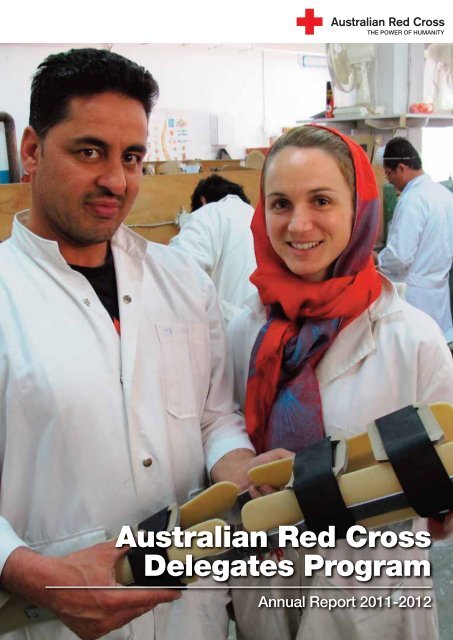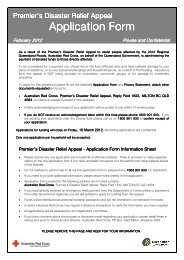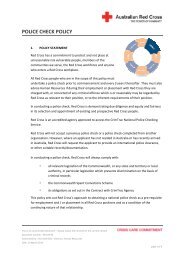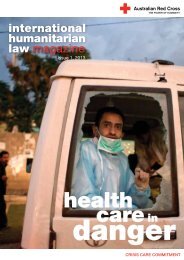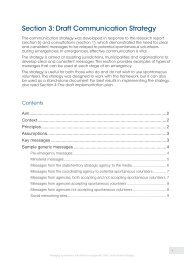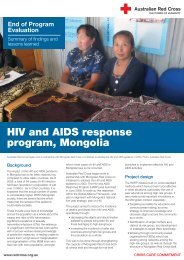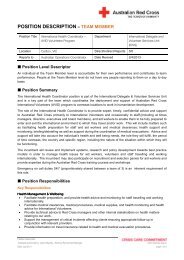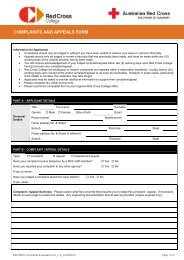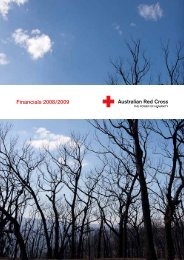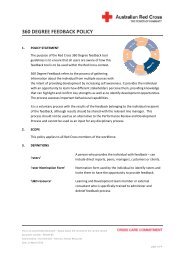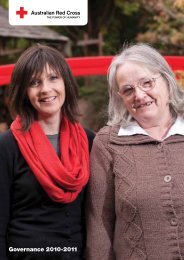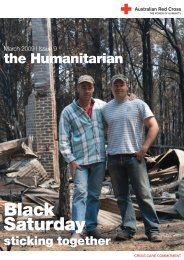Australian Red Cross Delegates Program
Australian Red Cross Delegates Program
Australian Red Cross Delegates Program
- No tags were found...
Create successful ePaper yourself
Turn your PDF publications into a flip-book with our unique Google optimized e-Paper software.
Executive summary03This report focuses on the overall achievements of the <strong>Australian</strong> <strong>Red</strong> <strong>Cross</strong><strong>Delegates</strong> <strong>Program</strong> in 2011/12; highlighting successes, challenges and progress inachieving the program’s four key objectives as well as continuous programimprovements.<strong>Australian</strong> <strong>Red</strong> <strong>Cross</strong> aid workers have made a significant contribution towards the<strong>Red</strong> <strong>Cross</strong> Movement efforts to address the needs of people made vulnerable bydisasters and conflict; the overall goal of the <strong>Australian</strong> <strong>Red</strong> <strong>Cross</strong> <strong>Delegates</strong><strong>Program</strong>. This has been achieved through program support for 141 1 short andlong-term missions throughout the 2011/12 financial year. Seventy two (51%) ofthese missions were supported through AusAID funding for the program 2 .<strong>Australian</strong> <strong>Red</strong> <strong>Cross</strong> aid workers were there to help vulnerable communities intimes of crisis. Following requests from <strong>Red</strong> <strong>Cross</strong> Movement partners, <strong>Australian</strong><strong>Red</strong> <strong>Cross</strong> rapidly mobilised expert and experienced aid workers to assist peopleaffected by disasters and emergencies; following flooding in Fiji, flooding and a ferrydisaster in Papua New Guinea, a cholera outbreak in Chad, drought in Ethiopia,and tropical storm damage in Mozambique.While the majority (74%) of all deployments were in the Asia Pacific region,<strong>Australian</strong> aid workers continued to support large-scale response and recoveryefforts around the globe; in Haiti and Pakistan, as well as in conflict areas such asAfghanistan, Gaza, Libya, Somalia, Sudan, Syria and Yemen.In addition to direct service provision and relief, response and recovery efforts,delegates worked alongside local counterparts on disaster preparedness and riskreduction programs to strengthen the capacity of national societies to assistvulnerable people in future times of need. <strong>Delegates</strong> held key senior positions in theAsia Pacific region, supporting <strong>Australian</strong> <strong>Red</strong> <strong>Cross</strong> bilateral programs andstrengthening disaster management programming throughout the Movement.Delegate retention and engagement continued to be a strong focus this year with atotal of 109 delegates receiving professional development training. Thirty-twodelegates attended advanced technical trainings such as Emergency ResponseUnit (ERU) and nutrition in emergencies, and 77 delegates attended professionalskills training through courses on program design, monitoring and evaluation,capacity development across cultures and media training.<strong>Australian</strong> <strong>Red</strong> <strong>Cross</strong> acknowledges the valuable contribution of the <strong>Australian</strong>Government’s overseas aid program, AusAID, in supporting this program andenabling suitably qualified, experienced and dedicated <strong>Australian</strong>s 3 to participate inits humanitarian programs abroad.1. This number includes both new missions and mission extensions2. AusAID funding has been utilised to fully fund missions and also to contribute funding to missions withadditional funding sources3. The majority of <strong>Australian</strong> <strong>Red</strong> <strong>Cross</strong> delegates hold <strong>Australian</strong> citizenship or residency, however a smallproportion of <strong>Australian</strong> <strong>Red</strong> <strong>Cross</strong> delegates are not <strong>Australian</strong> citizens or residents.
04<strong>Delegates</strong> <strong>Program</strong> Annual Report 2011-2012<strong>Delegates</strong>program overviewAs a member of the International <strong>Red</strong> <strong>Cross</strong> and <strong>Red</strong> Crescent Movement,<strong>Australian</strong> <strong>Red</strong> <strong>Cross</strong> is part of the world’s largest humanitarian network. Withmillions of volunteers, members and staff across 188 countries, <strong>Red</strong> <strong>Cross</strong> is in aunique position to reach vulnerable people quickly in times of need and to workwith local people to provide the most appropriate assistance.<strong>Australian</strong> <strong>Red</strong> <strong>Cross</strong> recruits, trains, deploys and supports technical specialists,who utilise their skills and experience around the world in response to requestsfrom any part of the International <strong>Red</strong> <strong>Cross</strong> <strong>Red</strong> Crescent Movement. <strong>Australian</strong><strong>Red</strong> <strong>Cross</strong> delegates may be mobilised to:• Work with the International Federation of <strong>Red</strong> <strong>Cross</strong> and <strong>Red</strong> CrescentSocieties (‘the Federation’) to respond to the immediate impacts of disasters.• Work with the International Committee of the <strong>Red</strong> <strong>Cross</strong> (ICRC) to provideurgent humanitarian assistance to people affected by war and armed conflict.• Work with the Federation and National <strong>Red</strong> <strong>Cross</strong> Societies to assist peopleto prepare for and recover from disasters and achieve healthier, safer andmore sustainable lives.<strong>Delegates</strong> share their technical expertise, working directly with people in vulnerablesituations as well as strengthening the capacity of national societies to be effective,well-functioning humanitarian organisations. Through these deployments, delegatescontribute to the program’s four objectives, including:1. To help strengthen the <strong>Red</strong> <strong>Cross</strong> Movement’s disaster managementcapacity, particularly in the Asia Pacific, by strategically deploying disastermanagement delegates 1 to key roles 2 within the Federation and/or supportingnational societies.2. To assist disaster prone and disaster affected communities, particularly in theAsia Pacific, by mobilising rapidly deployable disaster response delegates 3 tosupport <strong>Red</strong> <strong>Cross</strong> National Societies’ disaster response activities.3. To contribute to the ICRC’s global mandate to help victims of conflicts andinternal violence by deploying suitably skilled delegates.4. To contribute to the effectiveness of <strong>Australian</strong> <strong>Red</strong> <strong>Cross</strong> programming,particularly in disaster management, by acquiring, retaining and sharing theknowledge and experience of returned delegates.1. Disaster management delegates include delegates skilled in water sanitation, health, shelter, logistics, tracingand general disaster management (including response, preparedness and recovery).2. Key roles are missions that have a disaster management focus in the Asia Pacific, or positions aligned with<strong>Australian</strong> <strong>Red</strong> <strong>Cross</strong> disaster management programming, including grassroots positions or senior positions ofinfluence in key locations.3. Relief supplies and technical equipment may also be dispatched as part of other <strong>Australian</strong> <strong>Red</strong> <strong>Cross</strong>programs or appeals, to support disaster response activities.
<strong>Program</strong>achievements05Objective One: To help strengthen the <strong>Red</strong> <strong>Cross</strong>Movement’s disaster management capacity, particularly inthe Asia Pacific, by strategically deploying disastermanagement delegates to key roles within the Federationand/or supporting national societies.In recognition of the continued challenges countries in the Asia Pacific region faceduring times of disasters, <strong>Australian</strong> <strong>Red</strong> <strong>Cross</strong> maintains a firm commitment tostrengthening the capacity and resilience 1 of communities, by working with nationalsocieties and the Federation on disaster management programming, includingdisaster risk reduction and preparedness, response and recovery.<strong>Australian</strong> <strong>Red</strong> <strong>Cross</strong> deployed disaster management delegates, includingdelegates skilled in water and sanitation, health, shelter, logistics and programmanagement to work with the Federation and national societies in the Asia Pacificregion. Strengthening capacity is an inherent feature of all missions undertaken bydelegates. <strong>Australian</strong> <strong>Red</strong> <strong>Cross</strong> delegates work to improve knowledge, skills andpractice at all levels, whether at the organisational and institutional levels throughpolicy development and coordination to influence practice, or at the communitylevel to directly achieve better outcomes for vulnerable people.Indicator 1: At least two disaster management-focussed positions in theFederation’s Asia Pacific zone headquarters are supported by<strong>Australian</strong> <strong>Red</strong> <strong>Cross</strong>.Six positions in the Federation’s Asia Pacific zone headquarter office weresupported by the <strong>Australian</strong> <strong>Red</strong> <strong>Cross</strong> <strong>Delegates</strong> <strong>Program</strong>. AusAID programfunding supported four of these positions for a total of 48 months in the field.Disaster management positions included the Head of the Disaster ManagementUnit for the region (Michael Annear); Regional Water and Sanitation Coordinator(Kathryn Clarkson); Regional Shelter Coordinator (Gregg McDonald); Senior Officer,Quality and Accountability, Tsunami Unit (Chris Staines); IDRL 2 Asia PacificCoordinator (Tessa Kelly); and IDRL Legal Officer (Lucia Cipullo).Inherent in these long-term strategic and influential positions was the developmentof strategies and policies to provide overarching guidance in the area of disasterpreparedness, response and recovery. This work enhances internationalcoordination and promotes an integrated and consistent approach to all aspects ofthe Federation’s disaster management work with national societies in the AsiaPacific region. This includes capacity and resilience strengthening at the communitylevel, through disaster risk reduction and response preparedness, to recoveryprogramming including addressing cross cutting issues such as climate changeadaptation.1. Resilience is defined as ‘the ability of individuals, communities, organisations, countries exposed to disaster,crisis and underlying vulnerabilities to anticipate, reduce the impact of, cope with and recover from the effectsof adversity without compromising their long term prospects’.2. International Disaster Response Law
Indicator 2: At least one Federation Head of Delegation / CountryRepresentative in the Asia Pacific is supported by <strong>Australian</strong><strong>Red</strong> <strong>Cross</strong>.Four Head of Delegation or Country Representative positions in the InternationalFederation of <strong>Red</strong> <strong>Cross</strong> were held by <strong>Australian</strong> <strong>Red</strong> <strong>Cross</strong> aid workers in the2011-2012 financial year.These positions included the Head of Delegation position in Indonesia (PhilCharlesworth), the Country Representative position in Timor Leste (ValerieHunnam), as well as the Head of Delegation position in Mongolia (Javier Barrera)and the Country Representative position in Nepal (Victoria Bannon).Having a number of <strong>Australian</strong> delegates in senior positions in the Federation hasincreased Australia’s representation and influence across the region, and presentedstrategic benefits for <strong>Australian</strong> <strong>Red</strong> <strong>Cross</strong>’ bilateral programs.Through her attendance at UN security meetings, Valerie Hunnam, CountryRepresentative in Timor Leste, has been able to strengthen <strong>Red</strong> <strong>Cross</strong> knowledgeof the local security situation, improving programming at the grassroots level.Country Representative for the Federation in Nepal, Victoria Bannon, like ValerieHunnam in Timor Leste, is an active participant at UN forums and cluster meetings,most notably the Nepal Risk <strong>Red</strong>uction Consortium which brings togetherhumanitarian, development and funding agencies with the Government of Nepal inorder to reduce Nepal's vulnerability to natural disasters. Her participation andinformation sharing have helped strengthen the role of the <strong>Red</strong> <strong>Cross</strong> <strong>Red</strong> CrescentMovement and provided Australia <strong>Red</strong> <strong>Cross</strong> with insights into the disaster riskreduction sector in the region.As the Federation Country Representative, Victoria has a close and trustedrelationship with the Nepal <strong>Red</strong> <strong>Cross</strong> Society especially with senior and middlemanagement and has provided advice to <strong>Australian</strong> <strong>Red</strong> <strong>Cross</strong> on many occasionsto help inform decisions on programming. Victoria has also been involved in theinitial meeting between AusAID post and <strong>Australian</strong> <strong>Red</strong> <strong>Cross</strong>, as well as twosubsequent joint <strong>Australian</strong> <strong>Red</strong> <strong>Cross</strong>-Nepal <strong>Red</strong> <strong>Cross</strong> Society proposals forAusAID funding.Photo: <strong>Australian</strong> <strong>Red</strong> <strong>Cross</strong> delegate and IFRC country Director Valerie Hunnam discusses plans with LucasGodsnho, disaster response manager at Timor Leste <strong>Red</strong> <strong>Cross</strong>. Photo: <strong>Australian</strong> <strong>Red</strong> <strong>Cross</strong>/Conor Ashleigh.
Indicator 3: At least two disaster management-focussed positions workingwith national societies throughout the Asia Pacific are supportedby <strong>Australian</strong> <strong>Red</strong> <strong>Cross</strong>.09The <strong>Australian</strong> <strong>Red</strong> <strong>Cross</strong> <strong>Delegates</strong> <strong>Program</strong> supported 13 disaster managementfocussedmissions in the Asia Pacific region for a total of 83.5 months in the field.Disaster Management <strong>Delegates</strong> assisted national societies in the Solomon Islands(Suresh Pokharel), Philippines (Catherine Gearing), and Kiribati (Tim Lewis-Nicholson). The <strong>Delegates</strong> <strong>Program</strong> also supported a Disaster ManagementRecovery Delegate (Kate Davies) in Tuvalu, a Disaster Management Coordinator(Luigi Viscardi) in Samoa and a Recovery Outreach Worker (Andrew Romanin) inNew Zealand. Two delegates also undertook two consecutive missions throughoutthe financial year, Manish Tewani held the roles of Community-Based DisasterPreparedness Delegate and then Community Resilience <strong>Program</strong> Manager in China,and Gaurav Ray held the positions of Regional Disaster Management Coordinator inBangladesh and then Regional Disaster Preparedness Advisor in India.Additionally, the <strong>Delegates</strong> <strong>Program</strong> supported three missions with the Federationat the regional level for the Pacific, based in Fiji: Regional Shelter/Disaster Managerdelegates (Michael Gloeckle and David O’Meara), and Regional DisasterManagement Coordinator (Ysabeau Rycx).The <strong>Delegates</strong> <strong>Program</strong> also supported eight water and sanitation, shelter andlogistics missions, all of which supported national societies with general disastermanagement preparedness. This included Water and Sanitation <strong>Delegates</strong> inPapua New Guinea (David Hancock and Peter O’Keeffe), a Shelter Delegate inVanuatu (Francisco Monteiro) and Logistics <strong>Delegates</strong> in Tonga (Greg Platt),Micronesia, Papua New Guinea and Solomon Islands (Grant Kelly).The <strong>Delegates</strong> <strong>Program</strong> maintains a strong focus on disaster management;encompassing both environmental and man made disasters and includes all stagesof disaster management; from preparedness, response and relief, to recovery.Embedding delegates in national societies where <strong>Australian</strong> <strong>Red</strong> <strong>Cross</strong> implementsbilateral programs enhances responsiveness and implementation at the grassrootslevel, while also strengthening the capacity of national society staff.
10<strong>Delegates</strong> <strong>Program</strong> Annual Report 2011-2012> CASE STUDYSupporting localresponses<strong>Australian</strong> <strong>Red</strong> <strong>Cross</strong> delegate CATHERINE GEARING explains howsupporting Philippines <strong>Red</strong> <strong>Cross</strong> manage community-based projects,with design documents and baseline surveys, is critical to achievingsustainable outcomes for communitiesEleven-year-old May Ann is washing her hands, twining her fingers together,fastidiously scrubbing beneath the nails. “It’s so I don’t spread germs and get sick,”she explains, a shy smile spilling across her face. The tap she is using, and thewater tank that feeds it, are still new to May Ann’s small elementary school in themountains of La Union province, Philippines. Built by Philippine <strong>Red</strong> <strong>Cross</strong> withAusAID funding, these facilities are intended to reduce water-borne and hygienerelatedillnesses among the students.The taps and toilets are connected to a central rainwater tank by a standardsystem of supply and drain pipes. But supporting the entire project is an intangibleinfrastructure of documentation, research and evaluation, as critical to success as atoilet that flushes.<strong>Australian</strong> <strong>Red</strong> <strong>Cross</strong> delegate Catherine Gearing is one of the key architectsbehind this infrastructure. For nearly two years, she has been assisting Philippine<strong>Red</strong> <strong>Cross</strong> to build its capacity to manage community-based health and disastermitigation projects funded by international donors.“I started my mission as a disaster adviser but it’s become broader and I’m nowlooking at components of health, water and sanitation projects,” says Catherine.“I work closely with the teams in the Manila headquarters as well as the staff in thechapters.”Catherine’s mission is crucial in ensuring that projects demonstrably achieve theirintended outcomes, actually improving the lives of the most vulnerable.Projects like the school-based water and sanitation project in La Union began witha needs assessment to identify the real health needs within the community andwhether they aligned with <strong>Red</strong> <strong>Cross</strong>’ capacity to provide support. Catherine’sinput is often to ensure that a wide cross-section of the community is consulted,including women, people with disabilities and especially children. “Children havesome of the highest needs in relation to health and are often the most impactedduring a disaster,” she explains.The needs assessment at the school identified that children at the local elementaryschool regularly experienced incidences of diarrhoea and gastroenteritis, thatchildren needed to bring in drinking water from home, and that the majoritypopulation at the school was Ibaloi, an indigenous community that received littleadditional support from other sources.
The next step was to create a project design, the responsibility of the La Unionchapter of Philippine <strong>Red</strong> <strong>Cross</strong>. Chapter administrator Almira Abregado is highlyappreciative of Catherine’s contribution. “When we were about to start with theproject, she was providing inputs on how to do the facilities, inputs for gender anddisability, and gave us pointers from previous projects she has participated in. Thesewere really very helpful for us to come up with the finished design document.”From here, Catherine worked with staff to establish the program logic, a model thatexplains how various outputs – such as toilet construction, hygiene educationsessions or the training of peer educators – will lead to the ultimate outcome ofreducing the incidence of illnesses caused by poor sanitation and hygiene.“There can be a tendency to just look at numbers – how many toilets have we built,rather than how people actually use those facilities and how it improves their health,”Catherine explains. “It’s equally important to focus on behaviour change and whatmakes an impact on people’s lives and this is where program logic comes in.”Catherine then worked with chapter staff to produce a baseline survey to identifychildren’s understanding of sanitation and hygiene, a crucial step to measuringfuture improvement. Here, gender considerations became vital. “Men and womenuse toilet facilities differently and have different needs,” she explains. “And at acertain age, girls don’t feel comfortable discussing that with boys present, so wemade sure there were separate groups with female facilitators.”While the toilets and taps were being built, so too were the tools used to measuretheir impact on the school community. “Monitoring and evaluation, if it’s done fromthe beginning, is not a difficult concept,” Catherine says. “We designed aframework that included the tools we would use, how regularly we would domonitoring, and how different people do different levels of monitoring andevaluation.” As a result of this framework, <strong>Red</strong> <strong>Cross</strong> volunteers in La Unionregularly undertake focus groups and stakeholder interviews with students,teachers and parents, using the results to identify significant changes in behaviourand their resulting effect on health.Strong working relationships between the chapter staff, volunteers and the<strong>Australian</strong> <strong>Red</strong> <strong>Cross</strong> delegate underpin the entire process. “We are in constantcommunication with Catherine,” says Almira. “If there are any issues with the projectactivities, she gladly gives us input on how to solve the problems we are having.”Catherine adds, “It’s about empowering staff to be decision makers in the project.Its their project not mine; they implement and make decisions, and anything theyneed support with, I’m here to help.”Photo: Children at Palina Elementary School show <strong>Australian</strong> <strong>Red</strong> <strong>Cross</strong> delegate Catherine Gearing the drawingsthey created to promote hygiene practices in their school. Photo: <strong>Australian</strong> <strong>Red</strong> <strong>Cross</strong>/Phil Brown.
Working in collaboration with the Movement’s unique community-based network ofnational society staff and volunteers, <strong>Australian</strong> <strong>Red</strong> <strong>Cross</strong> delegates are able torespond quickly and effectively to reach those most in need following disasters. Aidworkers deploy bilateral to assist national societies directly and also through theFederation, often as part of Field Assessment and Coordination Teams (FACT) toassess the immediate needs of affected communities and inform responseoperations.Indicator 4: <strong>Australian</strong> <strong>Red</strong> <strong>Cross</strong> maintains a separate register ofexperienced, specifically trained, medically cleared and rapidlydeployable delegates. 1<strong>Australian</strong> <strong>Red</strong> <strong>Cross</strong> maintained a register of 106 delegates with specific disasterand emergency response training and experience to be rapidly deployed inemergency response activities. The register is refreshed every three months toconfirm availability and prioritise selected delegates for provisional medicalclearance to facilitate the quickest deployment of aid workers when necessary.At any time <strong>Australian</strong> <strong>Red</strong> <strong>Cross</strong> has disaster management, shelter, water andsanitation, public health, logistics, nutrition, communications and media,psychosocial support and restoring family links (tracing) delegates on standby forimmediate deployment.Photo: Ba local community members, Fijian <strong>Red</strong> <strong>Cross</strong>, and <strong>Australian</strong> <strong>Red</strong> <strong>Cross</strong> water and sanitation specialist,Bob Handby, install water purification equipment to provide thousands of litres of safe water for local communities,following devastating floods in January 2012. Photo: Fiji <strong>Red</strong> <strong>Cross</strong>.1. <strong>Delegates</strong> have undergone specific training to use DRT equipment
Indicator 5: Upon request from Movement partners and subject to a needsassessment, disaster management delegates are deployed withina short timeframe.13The <strong>Australian</strong> <strong>Red</strong> <strong>Cross</strong> Rapid Deployment Register enabled delegates to be onthe ground assisting affected communities within short timeframes followingdisasters and requests from Movement partners in Chad, Ethiopia, Fiji,Mozambique and Papua New Guinea. <strong>Delegates</strong> were deployed and on the groundassisting affected communities and providing strategic operation and coordinationexpertise in the immediate aftermath of a number of devastating events:• Chad: <strong>Australian</strong> <strong>Red</strong> <strong>Cross</strong> delegate, Don Johnston was deployed as FieldAssessment and Coordination Team (FACT) Team Leader within 48 hours of arequest from the IFRC following a cholera epidemic. Health <strong>Delegates</strong>, BarbaraFord and Ruth Jebb were deployed within 48 and 72 hours respectively as part ofa FACT and Emergency Response Unit (ERU) Community Health Module.<strong>Australian</strong> <strong>Red</strong> <strong>Cross</strong> delegate, Kym Blechynden, was deployed as part of asecond rotation in the Emergency Response Unit (ERU) Community HealthModule following Ruth Jebb’s departure.• Ethiopia: <strong>Australian</strong> <strong>Red</strong> <strong>Cross</strong> delegate Dave O’Meara was deployed as anOperations Coordinator within 96 hours of a request from the Federation to assistfollowing drought in Ethiopia• Fiji: <strong>Australian</strong> <strong>Red</strong> <strong>Cross</strong> delegate, James Boyce was deployed within 72 hoursof a request from Fiji <strong>Red</strong> <strong>Cross</strong> following floods. He assisted <strong>Australian</strong> <strong>Red</strong><strong>Cross</strong> Water and Sanitation Manager Bob Handby who deployed within 24 hours.• Mozambique: <strong>Australian</strong> <strong>Red</strong> <strong>Cross</strong> delegate, Don Johnston was deployed asFACT Team Leader within 120 hours of a request from the IFRC after a tropicalstorm affected Mozambique. <strong>Australian</strong> <strong>Red</strong> <strong>Cross</strong> delegate, Tim Stats wasdeployed on a FACT shelter mission within 48 hours of a request from the IFRC.• Papua New Guinea: <strong>Australian</strong> <strong>Red</strong> <strong>Cross</strong> delegate, Katrina Neville wasdeployed within 48 hours of the ferry capsize disaster as a Restoring Family Links(RFL) Delegate. Water and Sanitation <strong>Delegates</strong>, David Hancock and PeterO’Keefe were on the ground to assist PNG <strong>Red</strong> <strong>Cross</strong> following flooding within48 and 72 hours, respectively.After receiving a request from the IFRC, delegate Don Johnston was deployed asFACT Team Leader to Chad within 24 hours. His role was to support <strong>Red</strong> <strong>Cross</strong> ofChad and coordinate with other Movement partners to respond quickly to thecholera epidemic. By coordinating a rapid assessment of the situation in Chad, Donwas able to develop a plan of action and rapidly mobilise Emergency ResponseUnits (ERUs) to begin implementation of the emergency response. This enabledswift delivery of curative care to people severely affected by cholera in areas wheresufficient health services were lacking, and provision of information to vulnerablecommunities about simple practices that would protect them against cholera.“ ”Don explains that his role in the rapid response to the Chad cholera epidemic wasstraightforward, “to prevent people from dying from an easily preventable disease”.
14<strong>Delegates</strong> <strong>Program</strong> Annual Report 2011-2012> CASE STUDYRemoving red tapefrom relief effortsDisaster strikes, donors rush in, chaos ensues… <strong>Australian</strong> <strong>Red</strong> <strong>Cross</strong>delegate TESSA KELLY is working with governments in the Asia-Pacificregion to ensure that disaster laws will be in place to support and guideinternational actors.Flooding in Manila, landslides in Papua New Guinea, earthquakes in Indonesia… naturaldisasters have become commonplace in the Asia-Pacific region, wreaking havoc onvulnerable communities. International donors often rush to provide assistance, but not allcountries have the laws or systems in place to readily accept this support.This provides ample challenges for <strong>Australian</strong> <strong>Red</strong> <strong>Cross</strong> delegate Tessa Kelly, whocoordinates the International Federation of <strong>Red</strong> <strong>Cross</strong> and <strong>Red</strong> Crescent Societies(IFRC) Disaster Law <strong>Program</strong> for the Asia Pacific. This program plays a critical rolein assisting governments to develop good laws and legal frameworks that can helpto reduce human suffering during times of disaster.Bureaucratic red tape related to entry visas, personnel registration, customsclearance, taxation and transport permissions can all significantly delay relief efforts.As Tessa explains, the proliferation of international responders can furthercomplicate matters for countries that are not prepared for outside assistance.“After the 2004 tsunami, around 200 non government organisations turned up to helpout…While it’s fantastic that so many actors want to get involved in providing assistance,unfortunately what we see is that the amount and variety of helpers can completelyoverwhelm the affected country if they’re not adequately prepared,” Tessa says.To address these issues, the IFRC promotes the use of guidelines for the domesticfacilitation and regulation of international disaster relief and initial recoveryassistance, also known as the International Disaster Response Law (IDRL)guidelines, which were adopted by all components of the <strong>Red</strong> <strong>Cross</strong> and <strong>Red</strong>Crescent Movement and the 194 states party to the Geneva Conventions in 2007.Tessa and her colleagues provide technical assistance to governments in the AsiaPacific region, developing training and tools on IDRL and engaging in advocacy toraise awareness about the need for comprehensive disaster legislation. A particularlysignificant breakthrough has been made in Indonesia, where the government hasincorporated the IDRL guidelines into its legal framework for disaster managementas the result of a six-year program of assistance and advocacy from the IFRC andPalang Merah Indonesia (PMI), the Indonesian <strong>Red</strong> <strong>Cross</strong>.IFRC and PMI began engaging with the Indonesian government in 2005 whenexamining the legal issues encountered in the wake of the Indian Ocean tsunami.“The IFRC and PMI raised awareness of the importance of comprehensively addressingthe facilitation and regulation of international assistance within the legal framework, andprovided advice and support to the government on how best to do this,” Tessa says.In 2007 the government created a new law on disaster management and establisheda National Disaster Management Agency (BNPB) tasked with coordinating riskreduction, strengthening response and leading emergency operations.In 2008, following advocacy from IFRC and PMI the government adopted a regulationaddressing international assistance to support the country’s new disaster law.
The following year PMI, in collaboration with BNPB, IFRC and the UN Office forCoordination of Humanitarian Affairs facilitated a workshop to discuss theimplementation of this regulation and how it conforms to the IDRL guidelines.“The outcome highlighted a need to develop a guideline on international disasterresponse, as a means to help integrate and encourage implementation of the newand existing regulations,” explains Tessa.By 2010, the government had adopted a new guideline on international disasterresponse, as recommended by PMI and other stakeholders. Tessa and hercolleagues have since started a new project in collaboration with Indonesian <strong>Red</strong><strong>Cross</strong> looking at implementation of the new legal framework on internationalassistance.In addition to IDRL, the Disaster Law <strong>Program</strong> addresses two other key issues:legislation for disaster risk reduction at the community level; and regulatory barriersto the provision of post-disaster shelter.Tessa and her colleagues are now in the initial stages of a global research project,which will assess national legislative frameworks and explore how disastermanagement laws can facilitate more resilient communities.“We’re conducting surveys where we look at all the laws and regulations that couldimpact on a community’s role in disaster risk reduction. This includes land useplanning, building codes, decentralisation of responsibilities and the role ofcommunity actors like local <strong>Red</strong> <strong>Cross</strong> or <strong>Red</strong> Crescent societies,” Tessa says.“With this research we will be able to put together a checklist for lawmakers ofwhat they should consider when developing rules and regulations for disaster riskreduction.”Tessa’s team has also been involved in first-time research focused on regulatorybarriers to the provision of post-disaster shelter.“We were hearing time and time again that there were problems concerning howland can be obtained quickly in a disaster to provide temporary housing and alsohow to avoid delays in implementing shelter solutions because of disputesconcerning ownership of land,” Tessa says. “This is a key issue of humanitarianconcern and it is something that we shouldn’t be ignoring.”While introducing effective disaster management legislation takes both time andpatience, Tessa and her colleagues have certainly achieved significantbreakthroughs in the Asia Pacific region. Their ongoing advocacy and technicalsupport is already helping countries to be better prepared to respond to disastersand will pave the way for future success stories in this field.Photo: The Indonesian Government is now addressing international assistance within its disaster response laws,as a result of a program of advocacy by the IFRC and Indonesian <strong>Red</strong> <strong>Cross</strong>. Photo: PMI/Indra Yogasara.
16<strong>Delegates</strong> <strong>Program</strong> Annual Report 2011-2012<strong>Australian</strong> <strong>Red</strong> <strong>Cross</strong> delegates working with ICRC directly assisted people affectedby conflict and other situations of violence, and worked to promote respect forinternational humanitarian law and its implementation in national law.<strong>Australian</strong> <strong>Red</strong> <strong>Cross</strong> supported the ICRC in a number of settings to improveaccess to basic preventative and curative health care for people affected by armedconflict, as well as worked with authorities to ensure detainees are treated withrespect and humanity. <strong>Delegates</strong> were also deployed to promote economic securityto ensure households and communities can meet essential needs, while water andhabitat projects were undertaken to create and maintain sustainable livingenvironments with access to clean water in conflict zones.Indicator 6: The ICRC consistently requests <strong>Australian</strong> <strong>Red</strong> <strong>Cross</strong> delegatesfor deployment.A total of 35 ICRC missions (totalling a combined 208 months in the field) wereundertaken by <strong>Australian</strong> <strong>Red</strong> <strong>Cross</strong> delegates to the following countries:Afghanistan (9), Colombia (2), Gaza (1), India (1), Kenya (1), Kyrgyzstan (1),Lebanon (1), Libya (2), Pakistan (3), Philippines (1), Russian Federation (2), Somalia(1), Sudan (5), Syria (1), and Yemen (3).The majority of delegates deployed included health professionals (24), protectiondelegates (8), water and sanitation delegates (2) and logistics delegates (1). Thesepositions ranged from nurses and nutritionists to tracing specialists, economicsecurity coordinators and water and habitat engineers.<strong>Australian</strong> <strong>Red</strong> <strong>Cross</strong> delegates regularly deploy on mission with the ICRC,contributing significantly to its mandate to assist people affected by conflict bytaking action in response to emergencies.Economic Security Delegate Hillary Floate was deployed on mission to droughtaffectedEast Africa, working with Somalia <strong>Red</strong> Crescent Society (SRCS) toimplement a community-based nutrition program. Through training, coaching anddirect collaboration with SRCS, local staff were able to establish and maintainclinics with acute malnutrition treatment services and to distribute food and wateras well as provide sanitation facilities. Hilary comments on one of the highlights ofher work: “The training of [SRCS] staff in community-based management of acutemalnutrition is always enjoyable…The fact that the SRCS clinics have admitted over22,000 children across their programs this year is also a highlight. We havemanaged to open 10 new outpatient therapeutic programs and 10 new mobileservices in a very short period - six weeks, which I think the staff can be very proudof. Without these services children with severe acute malnutrition are at increasedrisk of dying.”
21Indicator 7: Upon request from the ICRC, at least four delegates are deployedwith the ICRC globally, utilising AusAID funding.<strong>Australian</strong> <strong>Red</strong> <strong>Cross</strong> delegates were seconded on nine missions with the ICRC fora total of 46.2 months in the field this financial year. Of those, five missions (29.7months in the field) were supported with AusAID funding for the <strong>Delegates</strong> <strong>Program</strong>and four missions (16.5 months in the field) were supported by AusAID for the <strong>Red</strong><strong>Cross</strong> Sudan Fund.Four delegates were based in Sudan, including two Health <strong>Delegates</strong> (CatherineSalmon and Theane Theophilos), a Nutritionist (Joanne McElhinney), and a WardNurse (Catherine Salmon). Two Health <strong>Delegates</strong> were also based in Libya (NolaHenry and Catherine Salmon) 1 . Economic Security <strong>Delegates</strong> were deployed onmission in Afghanistan (Kerry Page) and Colombia (Sarah Wilson), while anOperating Theatre Nurse (Katherine Keenan) was based in Pakistan.One of the outcomes noted by Catherine Salmon of her mission in South Sudan asa ward nurse was an improvement in the nursing skills of hospital staff in relation tothe care of weapon wounded, trauma and emergency cases at Malakal Hospital.She noted that despite encountering many challenges, achievements were made inrelation to the confidence, work ethic and motivation of nursing staff and theirinvolvement in appropriate patient care.Indicator 8: Upon request from the ICRC, at least four delegates are deployedwith the ICRC globally, utilising ICRC funding.<strong>Australian</strong> <strong>Red</strong> <strong>Cross</strong> delegates deployed on 24 missions with, and funded by ICRC.<strong>Australian</strong> <strong>Red</strong> <strong>Cross</strong> delegates continue to be competitive in attaining positionswith ICRC open to multiple national societies, regardless of National Societyfunding. The high numbers of delegates deployed and funded by ICRCdemonstrates recognition within the ICRC and the broader Movement of the calibreand quality of <strong>Australian</strong> <strong>Red</strong> <strong>Cross</strong> delegates.Photo: Hilary Floate, an <strong>Australian</strong> <strong>Red</strong> <strong>Cross</strong> nutritionist working with ICRC in Somalia, works with local <strong>Red</strong> Crescentstaff and community members to see if children are suffering from nutrition-related illness. Photo: ICRC/Halani.1. Catherine Salmon undertook two short-term missions in the 2011/12 financial year.
18<strong>Delegates</strong> <strong>Program</strong> Annual Report 2011-2012> CASE STUDYDevices thatchange livesA <strong>Red</strong> <strong>Cross</strong> orthopaedic centre in Afghanistan offers rehabilitativeservices for people with a wide range of disabilities. From biomechanicstraining to the use of orthotic devices, <strong>Australian</strong> <strong>Red</strong> <strong>Cross</strong> delegateMARTINA LUKIN is supporting local technicians to provide the bestpossible treatment with limited resources.Decades of conflict have contributed to the range of disability issues in Afghanistan.In Kabul, the orthopaedic centre managed by the International Committee of the<strong>Red</strong> <strong>Cross</strong> (ICRC) sees and treats many of these disabilities every day, supportingpeople with mobility impairments to achieve a better quality of life.It is here that <strong>Red</strong> <strong>Cross</strong> delegate and ortho-prosthetist Martina Lukin works on thefrontline of disability services, sharing her expertise and helping staff to strengthentheir technical skills.“A result of war is that people are poorer than they would normally be, they are lesseducated, there is less access to nutritious foods, medicines and so on, whichmeans there is also a higher proportion of people with birth defects, spinal cordinjuries and other problems,” Martina says.“The orthopaedic program in Afghanistan is quite unique in the sense that we seeeveryone regardless of whether they have stepped on a landmine or not, becausetheir need is just as great. If we can help, then we try.”Although an accurate figure of Afghanistan’s population living with a physicaldisability is not available, estimates vary from 300,000 to 2 million 1 .It is little wonder then that people sometimes spend up to two days travelling to seespecialists in Kabul. ICRC has an additional six orthopaedic centres across thecountry, but Kabul is by far the largest.“We fit over 15 new patients every day...and that’s just for orthotics,” says Martina.“Every patient we see will leave our centre with some type of device that canchange their life, be it a simple shoe raise, a back brace, prosthesis or a pair ofankle foot orthoses. For some patients it’s the difference of being bed-bound tobeing able to stand and walk... for others it’s the difference between having chronicback pain and being able to live a normal life again.”Almost all Martina’s ICRC colleagues are people living with a disability. Althoughhighly skilled, many of the technicians have been trained primarily on the job and donot have formal qualifications. As a result, Martina’s role is instrumental.Only five months into her assignment, Martina has implemented regular case studysessions where the technicians are encouraged to discuss and analyse cases ofparticular interest, with a focus on how the orthotic or prosthetic treatment can beimproved.In coming months she will hold knowledge refresher sessions in areas such asbiomechanics and the effects of ground reaction forces in orthotics.1. Mallick, S 2007, Case Study: Persons with Disabilities in Afghanistan, United Nations Development<strong>Program</strong>me, viewed 11 September 2012,http://regionalcentrebangkok.undp.or.th/practices/governance/a2j/docs/CaseStudy-01-Afghanistan.pdf
“This is something that the technicians enjoy and it provides a good platform forasking questions and better understanding some ideas or concepts that can helpto improve their technical work,” Martina says.“I'm here to encourage the local staff to develop and strengthen their skills andknowledge, which is already at a very high standard, but most importantly to makesure our patients are receiving, and will continue to receive, the best possibletreatment with the limited resources we have available.”As well as physical rehabilitation, the ICRC orthopaedic centres support socialintegration of people living with a disability by providing vocational training, microcredit-loans and home education for children. “In terms of rehabilitation service wego from start to finish and the quality is really high,” Martina says.“We give people support to be able to go back to their families and survive in theircommunities, because sometimes it’s not very easy for them to integrate intosociety,” Martina explains. “It’s about increasing awareness about people withdisabilities and showing people that they can work and survive on their own.”Despite the complex array of needs and levels of disability in Afghanistan, Martinatakes a fairly uncomplicated approach to her work at the centre and she hopes thather colleagues will receive long-lasting benefit from her guidance and the skills thatshe has to share.“I like to follow an assessment process which I feel is really simple and effective...sothat is the kind of thing I want to convey to my technicians and hope that they takeon a similar process that will help to simplify their work and make them moreefficient and confident in what they do.”Photo: <strong>Australian</strong> <strong>Red</strong> <strong>Cross</strong> Ortho-Prosthetist delegate, Martina Lukin stands with her Afghani colleague, NoorMohamad. Martina is working with the International Committee of the <strong>Red</strong> <strong>Cross</strong> Orthopaedic <strong>Program</strong> as a technicaladvisor to improve the quality and management of services provided to people requiring prosthetic limbs inAfghanistan. Photo: <strong>Australian</strong> <strong>Red</strong> <strong>Cross</strong>/Mat Orr.
20<strong>Delegates</strong> <strong>Program</strong> Annual Report 2011-2012Indicator 9: Fifty percent of delegates in the field are on repeat missions ormission extensions with <strong>Australian</strong> <strong>Red</strong> <strong>Cross</strong>.Forty-six mission extensions were processed in the 2011/12 financial year. Of thetotal 662 months in the field for the 2011/12 financial year, 34% were completed bydelegates on mission extension. While there is an emphasis to extend missionswhere possible to retain the knowledge of delegates and ensure their work issustainable, the program is balancing this with a need to promote missionopportunities to as many delegates in the talent pool as possible.Of the 141 missions assigned this financial year, 37 (26%) were filled by first timedelegates and 104 (74%) were undertaken by delegates who had previouslycompleted one or more missions with <strong>Australian</strong> <strong>Red</strong> <strong>Cross</strong>.<strong>Delegates</strong> undertaking repeat missions or mission extensions represent anincreased return on investment, as fewer program resources are utilised in therecruitment and training of delegates for each deployment. <strong>Delegates</strong> undertakingmultiple missions are also able to apply the knowledge, skills and experiencegained through previous missions and adapt these to their current context.Having deployed on mission five times to countries including Vietnam, Papua NewGuinea and Pakistan, Water and Sanitation Delegate Suzie Sarkis reflects on whyshe continues to undertake missions as an aid worker with <strong>Australian</strong> <strong>Red</strong> <strong>Cross</strong>:“I am motivated by a desire to use my skills for humanitarian good. It is satisfyingbeing in an environment surrounded by people who are unified in providing help topeople who are less fortunate.”Indicator 10: Ninety percent of repeat missions or mission extensions with<strong>Australian</strong> <strong>Red</strong> <strong>Cross</strong> are filled by delegates with favourableperformance appraisals.One hundred percent of repeat missions or extensions were filled by delegates withabove satisfactory performance feedback.During monitoring trips to Afghanistan, Fiji, Haiti, Panama, and attendance at the<strong>Red</strong> <strong>Cross</strong> Asia regional meeting in Bali, meetings were held with seven delegatemanagers, all of whom reported positively on the professionalism and strongperformance of <strong>Australian</strong> <strong>Red</strong> <strong>Cross</strong> delegates.
Indicator 11: Fifty percent of returned delegates plan to make themselvesavailable for future missions with <strong>Australian</strong> <strong>Red</strong> <strong>Cross</strong>.21Once they have returned from mission, delegates are asked if they would beinterested in future missions with <strong>Australian</strong> <strong>Red</strong> <strong>Cross</strong>. Approximately 90% ofdelegates completing missions plan to make themselves available for future missionopportunities.Of the 103 delegates completing the <strong>Australian</strong> <strong>Red</strong> <strong>Cross</strong> <strong>Delegates</strong> EngagementSurvey in 2012, the majority agreed that <strong>Australian</strong> <strong>Red</strong> <strong>Cross</strong> is their preferredemployer for overseas missions.The survey also revealed delegates are motivated to work specifically with <strong>Australian</strong><strong>Red</strong> <strong>Cross</strong> for a number of reasons, most notably because of an alignment with thefundamental principles and values of the <strong>Red</strong> <strong>Cross</strong> <strong>Red</strong> Crescent Movement,previous experience working with <strong>Australian</strong> <strong>Red</strong> <strong>Cross</strong>, and specifically the <strong>Red</strong><strong>Cross</strong>’ ways of working and approach to humanitarian assistance.In responding to the survey, one delegate explained their commitment to deployingon mission with <strong>Australian</strong> <strong>Red</strong> <strong>Cross</strong>:“I believe <strong>Australian</strong> <strong>Red</strong> <strong>Cross</strong> has very strong policies particularly in relation topre-departure, in-country professional and residential arrangements and greathealth, safety and security policies and procedures.”Economic Security and Livelihoods Delegate Anne-Marie McCabe has completed anumber of missions with <strong>Australian</strong> <strong>Red</strong> <strong>Cross</strong>, seconded to the ICRC. Shecomments:“ ”Being seconded by <strong>Australian</strong> <strong>Red</strong> <strong>Cross</strong> not only gives me confidence I’msupported when on mission, it also gives me a sense of identity in the global<strong>Red</strong> <strong>Cross</strong> <strong>Red</strong> Crescent family.To be able to say I come from a national society gives an instant bond with mycounterparts in our sister national societies, which makes a big difference for ourteam work on the ground.“Being deployed to challenging and volatile contexts it gives me confidence that the<strong>Red</strong> <strong>Cross</strong> <strong>Red</strong> Crescent Movement is a trusted and well-respected humanitarianorganisation among the communities we seek to assist. I admire how the principlesof impartiality, neutrality and independence are entrenched in <strong>Red</strong> <strong>Cross</strong> <strong>Red</strong>Crescent work, and how this allows for unique access to the victims of conflictand/or natural disasters. It’s incredibly rewarding to be part of a team that gets inand gets the job done.”Indicator 12: Fifty percent of returned delegates are interested in supporting<strong>Australian</strong> <strong>Red</strong> <strong>Cross</strong> in another capacity in the future.Responses extracted from the <strong>Australian</strong> <strong>Red</strong> <strong>Cross</strong> <strong>Delegates</strong> Engagement Surveyin 2012 illustrated a strong interest by delegates to engage in non-mission activitieswith <strong>Australian</strong> <strong>Red</strong> <strong>Cross</strong>. Between 60% and 70% of delegates indicated fair tohigh interest in attending a delegate conference and state-based social networkingevents, as well as speaking at events and sharing their experiences for media andcommunications purposes.Returned delegates remain committed to <strong>Australian</strong> <strong>Red</strong> <strong>Cross</strong> and have a strongdesire to continue their engagement with the organisation. One <strong>Australian</strong> <strong>Red</strong><strong>Cross</strong> delegate commented in the delegate engagement survey that their desire towork specifically with <strong>Red</strong> <strong>Cross</strong> is due to their “desire to work for a well respectedorganisation that has the greatest reach”.
Indicator 13: <strong>Australian</strong> <strong>Red</strong> <strong>Cross</strong> personnel, particularly programming staff,benefit from delegates’ experience.<strong>Delegates</strong> shared their experiences and expertise with <strong>Australian</strong> <strong>Red</strong> <strong>Cross</strong>personnel by participating in a number of activities and events, including:• <strong>Australian</strong> <strong>Red</strong> <strong>Cross</strong>’ ‘roundtable’ strategic planning meetings in the sectors ofhealth, shelter and water and sanitation. Delegate participation provided:1. Insight into key programming challenges and suggestions for improvedprocesses to support them in their role.2. Insight into National Society capacity and made recommendations for futureprogramming.3. Input into key policy documents (such as health, water and sanitationposition papers) within International <strong>Program</strong>s to guide future programming inthese sectoral areas.4. Informed debate on models for engagement with national societies, based onthe realities in the field.• <strong>Australian</strong>-based training sessions, including IMPACT pre-deployment training• Lunchtime seminar series, conducted with national staff and delegate colleagues inMelbourne. Presentations were given by visiting and returning delegates including:Water and Sanitation Delegate Andrew Sheehan gave a presentation to staff on‘Demystifying PHAST’ and Health Delegate Ruth Jebb shared with staff herexperiences as a delegate with <strong>Australian</strong> <strong>Red</strong> <strong>Cross</strong> since 2005, includingdeployments in Kenya, Sudan and Haiti. Gebru Gebreselasie presented on hismission as an Economic Security Delegate in Pakistan as part of activities for Anti-Poverty Week; and Livelihoods Delegate Alex Murray presented her key findingsfrom an evaluation of the impact of seeds distribution and food parcel distributionsin Pakistan. International Disaster Response Law Coordinator Tessa Kelly providedinformation to staff on the work of the Disaster Law <strong>Program</strong> in the Asia Pacific;and David Curtis gave an overview of his work on disability inclusion in Cambodia.Further presentations were given by the Federation Head of Disaster ManagementUnit in the Asia Pacific, Michael Annear; Regional Shelter Coordinator forFederation in the Asia Pacific, Gregg McDonald; Restoring Family Links Delegate inTimor Leste, Kate Jones, Restoring Family Links Delegate in India, Jess Letch; and<strong>Program</strong> Advisor in Myanmar, Samadhi Marr.<strong>Australian</strong> <strong>Red</strong> <strong>Cross</strong> delegates also shared their skills and experience across thewider <strong>Red</strong> <strong>Cross</strong> <strong>Red</strong> Crescent Movement, through facilitating global Federationsector specific trainings, including shelter, Field Assessment Coordinator Team(FACT) and training with national societies including on beneficiary communications,logistics, and psychosocial support.Photo: <strong>Australian</strong> <strong>Red</strong> <strong>Cross</strong> Delegate Jess Letch coaches Angel, an Indian <strong>Red</strong> <strong>Cross</strong> Society staff member fromTamil Nadu, in a camp for Sri Lankan refugees. Photo: <strong>Australian</strong> <strong>Red</strong> <strong>Cross</strong>/Jess Letch.
25Indicator 14: Two monitoring visits undertaken.Monitoring visits were undertaken with delegates and their managers in Haiti andPanama, Afghanistan, and Fiji to identify any support needs delegates may have,as well as document mission achievements.Monitoring sessions were conducted with delegates at the Asia regional meeting,which included delegates on mission in Cambodia, China, Indonesia, Philippinesand Vietnam.Field monitoring also occurred with delegates based in Geneva, Kiribati andPhilippines while <strong>Australian</strong> <strong>Red</strong> <strong>Cross</strong> international program staff were travelling foradditional reasons.Several delegates and their managers commented specifically on how appreciatedthese monitoring visits were, as they reiterate the support available to delegates, anddemonstrate <strong>Australian</strong> <strong>Red</strong> <strong>Cross</strong>’ commitment to continuous program improvement.Feedback to inform program improvement was also collected during a <strong>Delegates</strong><strong>Program</strong> Reflections Workshop, which was attended by 12 experienced bilateraldelegates in Melbourne in May 2012. A key outcome of this activity was thedevelopment of an Action Plan and recommendations for improvements in threeareas: program operations; program quality; and delegate and program support.This information was supplemented by information collected through the annualdelegates engagement survey, which sought to collect feedback from the entiredelegate talent pool in a number of areas including delegate motivation andengagement, training, and program support. Recommendations have also beendeveloped to address specific issues raised through the survey, which will beimplemented throughout the course of the 2012/13 financial year.These monitoring visits and feedback mechanisms assisted with strategy andplanning activities, including workforce planning, opportunities forshadowing/mentored missions, prioritisation and budgeting of trainingopportunities, and the development of a delegate engagement strategy for the2012-2013 financial year.Photo: Andre Ullal, left, from <strong>Australian</strong> <strong>Red</strong> <strong>Cross</strong>, and Mahnoor Khan, from Pakistan <strong>Red</strong> Crescent, survey floodaffected areas during an evaluation visit to northern Pakistan. Andre Ullal was in Pakistan in 2011 to assess <strong>Australian</strong><strong>Red</strong> <strong>Cross</strong> funded shelter projects for people affected by the massive 2010 floods. Photo: <strong>Australian</strong> <strong>Red</strong> <strong>Cross</strong> /Ade Sonyville.
24<strong>Delegates</strong> <strong>Program</strong> Annual Report 2011-2012Deployment dataDeploymentsA total of 141 missions were supported by the <strong>Delegates</strong> <strong>Program</strong> in the 2011-2012 financial year. As at 1 July 2011, 50 delegates were in the field. Over thefollowing twelve months, the <strong>Delegates</strong> <strong>Program</strong> deployed aid workers on 91 newmissions, to reach the total of 141 supported missions over the financial year.These missions were undertaken by 108 individual delegates, 26 of whomundertook more than one mission in the financial year.Supporting Movement partners• 47 missions deployed to the International Federation of the <strong>Red</strong> <strong>Cross</strong> <strong>Red</strong> Crescent• 35 missions deployed to the International Committee of the <strong>Red</strong> <strong>Cross</strong>• 59 missions deployed bilaterally, to partner National <strong>Red</strong> <strong>Cross</strong> <strong>Red</strong> CrescentSocieties (which includes emergency response deployments).25%Secondment to ICRCin conflict and complexemergency settingsICRC42%Direct bilateral programswith other <strong>Red</strong> <strong>Cross</strong>National SocietiesBILATERAL<strong>Australian</strong><strong>Red</strong> <strong>Cross</strong>33%Secondment to IFRCin support of disasterrelief and preventionIFRC
Deployments by profile2518Disaster management38Health9Logistics25Management and programming5Media and communications12Protection46ShelterSupport services1514Training facilitationWater and sanitationProfile NotesDisaster management missions include general disaster management, preparedness and risk reduction delegates.Health missions include ward nurses, surgeons, biomedical engineers, ortho-prosthetists, nutritionists,psychosocial support, public health and economic security delegates.Support services include media and communications, finance, security, training facilitation and legal delegates.Management and programming includes delegation management, reporting and information, and monitoringand evaluation delegates.Protection includes restoring family links, detention and polyvalent delegates.Deployments summaryThe following analysis includes data on the entire <strong>Delegates</strong> <strong>Program</strong> and thecomponent of the <strong>Delegates</strong> <strong>Program</strong> funded by the AusAID.Altogether the AusAID <strong>Australian</strong> <strong>Red</strong> <strong>Cross</strong> <strong>Delegates</strong> <strong>Program</strong> funded 293 monthsin the field, with missions varying from several weeks to 12 months in duration.Statistic<strong>Delegates</strong><strong>Program</strong>AusAID funded <strong>Australian</strong><strong>Red</strong> <strong>Cross</strong> <strong>Delegates</strong> <strong>Program</strong>Total missions 141 72New deployments this FY 91 53Returned from mission 97 47Countries deployed to 46 33Individual delegates deployed 108 58Extensions processed 46 20Months in the field 662 299Advanced delegate trainings 32 16Professional skills trainings 77 77
David O'MearaShelter Technical Training Facilitator, IFRCAmanda McClellandHealth, IFRCSintaro MahamaLogistics, IFRCSWITZERLANDCOLOMBIALIBERIADonald JohnstonLogistics, IFRCDonald JohnstonFACT InductionTraining Facilitator, IFRCPaul GriersonLogistics, IFRCPANAMASarah WilsonEconomic Security, ICRCPaolo PolimeniProtection, ICRCCOLOMBIANola HenryHealth, ICRCCatherine SalmonHealth, ICRCLIBYADon AtkinsonWatSan & Hygiene, ARCCaroline AustinMedia & Communications, IFRCYvette SperoHealth, IFRCPaula FitzgeraldManagement & <strong>Program</strong>ming, IFRCAmber MackaySupport Services, IFRCChristopher HoweShelter, IFRCTimothy StatsShelter, IFRCHAITI<strong>Australian</strong> <strong>Red</strong> <strong>Cross</strong> <strong>Delegates</strong> <strong>Program</strong>Deployments - July 2011 to June 2012
GAZACHADCHADDonald JohnstonDisaster Management, IFRCKym BlechyndenHealth, IFRCBarbara FordHealth, IFRCRuth JebbHealth, IFRCSUDANDavidSmithHealth,ICRCAnn-MarieMcCabeEconomicSecurity, ICRCJoanne McElhinneyHealth, ICRCCatherine SalmonHealth, ICRCTheane TheophilosHealth, ICRCGiovanni TrambaioloProtection, ICRCLEBANONGAZA/OCCUPIED PALESTINIAN TERRITORIESKENYASYRIADorsa Nazemi-SalmanProtection, ICRCCatherine FryHealth, ICRCETHIOPIAMOZAMBIQUEMOZAMBIQUEETHIOPIASOMALIAYEMENSOMALIACatherineFryChanHealth, ICRCBarbaraMcMasterHealth, ICRCHilary FloateHealth, ICRCDavid O’MearaDisaster Management,IFRCTimothy StatsShelter, IFRCDonald JohnstonDisaster Management, IFRCLouise BroomheadHealth, ICRCMegan FergusonHealth, ARCPaula FitzgeraldManagement &<strong>Program</strong>ming, IFRCCristina de LeonHealth, ICRCDianne HodgsonHealth, ICRCMartina LukinHealth, ICRCDiane McInnesHealth, ICRCKerry PageEconomic Security, ICRCMonika ErkelensProtection, ICRCVicky LinProtection, ICRCDaniel Owe-YoungWatSan & Hygiene, ICRCMike ShearingWatSan & Hygiene, ICRCGaurav RayDisaster Management, IFRCCaroline AustinBeneficiary CommunicationsTraining Facilitator, IFRCGaurav RayDisaster Management, IFRCUZBEKISTANMichael HigginsonManagement &<strong>Program</strong>ming, IFRCAFGHANISTANPAKISTANJessica LetchProtection, ICRCNola HenryHealth, ICRCMALDIVESManish TewaniDisaster Management, ARCBin SuManagement &<strong>Program</strong>ming, ARCAnnalisa TidonaManagement &<strong>Program</strong>ming, ARCVictoria BannonManagement &<strong>Program</strong>ming, IFRCLibby BowellField School TrainingFacilitator, IFRCMALDIVESKYRGYZSTANKYRGYZSTANSally CrawshawHealth, ARCAlexandra MurrayManagement & <strong>Program</strong>ming, ARCMichael HigginsonManagement & <strong>Program</strong>ming, IFRCCaroline AustinMedia & Communications, IFRCJoe CroppMedia & Communications, IFRCGebreselasie GebruHealth, ICRCKatherine KeenanHealth, ICRCClaire DavisLogistics, IFRCINDIANEPALBANGLADESHSamadhi MarrManagement &<strong>Program</strong>ming, ARCCHINAJo ShetliffeManagement &<strong>Program</strong>ming, ARCLucinda LovelockProtection, ARCMYANMARBryan RochelleManagement &<strong>Program</strong>ming, IFRCMONGOLIATHAILANDCatherine GearingDisaster Management, ARCJames RodgerSupport Services, ARCAvril PattersonHealth, ICRCKim WheelerManagement &<strong>Program</strong>ming, ARCJavier BarerraManagement &<strong>Program</strong>ming, IFRCMALAYSIAVIETNAMCAMBODIAINDONESIAPHILIPPINESSacha BootsmaManagement &<strong>Program</strong>ming, ARCWilliam MarsdenManagement &<strong>Program</strong>ming, ARCPhillip CharlesworthManagement &<strong>Program</strong>ming, IFRCDavid CurtisManagement &<strong>Program</strong>ming, ARCKara JenkinsonManagement & <strong>Program</strong>ming, ARCSelina ChanWatSan Training Facilitator, ARCMichael AnnearDisaster Management, IFRCLucia CipulloDisaster Management, IFRCTessa KellyDisaster Management, IFRCChris StainesDisaster Management, IFRCGregg McDonaldShelter, IFRCKathryn ClarksonWatSan & Hygiene, IFRCEAST TIMOREAST TIMORRUSSIAN FEDERATIONVesna ZvonarProtection, ICRCRUSSIANFEDERATIONCatherine JonesProtection, ARCDedy UndrueSupport Services, ARCStuart BryanWatSan & Hygiene, ARCLinda O'BrienHealth, IFRCValerie HunnamManagement &<strong>Program</strong>ming, IFRCPAPUA NEW GUINEAMICRONESIALibby BowellHealth, ARCDonald JohnstonLogistics, ARCRebecca McNaughtManagement &<strong>Program</strong>ming, ARCFrancisco MonteiroShelter, ARCKezia BrettSupport Services, ARCGrant KellyLogistics TrainingFacilitator, ARCKatrina NevilleProtection, ARCDavid HancockWatSan & Hygiene, ARCPeter O'KeeffeWatSan & Hygiene, ARCKarina CoatesWatSan & Hygiene, IFRCSuresh PokharelDisaster Management, ARCLibby BowellHealth, ARCGrant KellyLogistics TrainingFacilitator, ARCPaul ByleveldWatSan & Hygiene, ARCNicole TeoWatSan & Hygiene, ARCGreg PlattLogistics TrainingFacilitator, ARCPeter McArdleWatSan &Hygiene, ARCDonal O'SuilleabhainWatSan &Hygiene, ARCHelen SalvestrinWatSan &Hygiene, ARCMICRONESIAGrant KellyLogistics TrainingFacilitator, ARCGreg PlattLogistics TrainingFacilitator, ARCMargaretRichardsonManagement &<strong>Program</strong>ming,IFRCSOLOMON ISLANDSNEW CALEDONIAVANUATUNEW CALEDONIANEW ZEALANDFIJIJessica LetchManagement & <strong>Program</strong>ming, ARCJames BoyceWatSan & Hygiene, ARCDavid O'MearaDisaster Management, IFRCYsabeau RycxDisaster Management, IFRCJessie KanhutuHealth, IFRCMichael GloeckleShelter, IFRCTUVALUTUVALUKIRIBATIKIRIBATISAMOATONGALuigi ViscardiDisasterManagement, ARCNatasha FreemanLogistics TrainingFacilitator, ARCGreg PlattLogistics TrainingFacilitator, ARCRobert NeilsonSupport Services, ARCGreg PlattLogistics TrainingFacilitator, ARCTim Lewis-NicholsonDisaster Management, ARCKate DaviesDisaster Management, ARCAndrew RomaninDisaster Management, ARCLoren HackettHealth, ARCSally PaynterRecovery Training Facilitator, ARCNatasha FreemanLogistics Training Facilitator, ARCTim Lewis-NicholsonLogistics Training Facilitator, ARCGregory PlattLogistics Training Facilitator, ARC
<strong>Australian</strong> <strong>Red</strong> <strong>Cross</strong> <strong>Delegates</strong> <strong>Program</strong>Deployments by Region - July 2011 to June 201210 24Caribbean & Latin America Africa & Middle EastEconomic Security .......................................... 1Health.............................................................................. 1Logistics ...................................................................... 1Management & <strong>Program</strong>ming.............. 1Media & Communications........................ 1Protection .................................................................. 1Shelter ............................................................................ 2Support Services................................................ 1WatSan & Hygiene............................................ 1Disaster Management .................................. 3Economic Security .......................................... 1Health.......................................................................... 16Logistics ...................................................................... 1Protection .................................................................. 1Shelter ............................................................................ 1Training Facilitator.............................................. 1Countries have been categorised into regions according to AusAID classifications.5EuropeHealth.............................................................................. 1Logistics ...................................................................... 1Protection .................................................................. 2Training Facilitator.............................................. 129South & West AsiaDisaster Management .................................. 2Economic Security .......................................... 1Health.............................................................................. 9Logistics ...................................................................... 1Management & <strong>Program</strong>ming.............. 5Media & Communications........................ 3Protection .................................................................. 4Training Facilitator.............................................. 2WatSan & Hygiene............................................ 230East AsiaDisaster Management .................................. 7Health.............................................................................. 2Management & <strong>Program</strong>ming.......... 13Protection .................................................................. 2Shelter ............................................................................ 1Support Services................................................ 2Training Facilitator.............................................. 1WatSan & Hygiene............................................ 243PacificDisaster Management .................................. 7Health.............................................................................. 6Logistics .................................................................. 12Management & <strong>Program</strong>ming.............. 3Media & Communications........................ 1Protection .................................................................. 1Shelter ............................................................................ 2Support Services................................................ 2Training Facilitator.............................................. 1WatSan & Hygiene............................................ 8
TrainingA total of 22 new delegates and 17 staff delegates were recruited and trainedthrough two International Mobilisation and Preparation for Action (IMPACT) coursesconducted during the year.In addition, 32 places at advanced trainings such as Emergency Response Unit(ERU), Field Assessment Coordinator Team (FACT), Federation Early RecoverySurge Team (ERST) training, shelter technical training, and nutrition in emergenciestraining were supported. A further 77 delegates were supported to attendprofessional development trainings facilitated by <strong>Australian</strong> <strong>Red</strong> <strong>Cross</strong>, including<strong>Program</strong> Design, Monitoring and Evaluation (PDM&E) training, CapacityDevelopment Across Cultures (CDAC) training and media training.AusAID funding for the program provided 16 advanced technical trainingopportunities and 77 opportunities for professional skills development training fordelegates. This training not only to ensures <strong>Australian</strong> <strong>Red</strong> <strong>Cross</strong> aid workerscontinue to be experts in providing humanitarian assistance, but is a key feature of<strong>Red</strong> <strong>Cross</strong>’ retention and engagement strategy.29Talent PoolIn the 2011-2012 financial year, the <strong>Australian</strong> <strong>Red</strong> <strong>Cross</strong> international delegatetalent pool held 467 delegates. Of the active delegates in the talent pool, 291(62%) are female and 176 (38%) are male.Sex disaggregated data on delegate talent pool38% male62% female
30<strong>Delegates</strong> <strong>Program</strong> Annual Report 2011-2012Promotion of<strong>Australian</strong> identity<strong>Australian</strong> <strong>Red</strong> <strong>Cross</strong> highlights the work of its international aid workers through anumber of mediums whenever possible. To recognise and promote thehumanitarian work that <strong>Australian</strong> <strong>Red</strong> <strong>Cross</strong> delegates are undertaking in the AsiaPacific region and further afield, news updates, case studies and interviews havebeen regularly uploaded to the <strong>Australian</strong> <strong>Red</strong> <strong>Cross</strong> website, published in theHumanitarian and Upfront magazines, as well as promoted through public media.In the last financial year, ten case studies were developed and publishedhighlighting the work of delegates in the areas of water and sanitation, shelter,disaster management, health, economic security and monitoring and evaluation. Allcase studies included a text box emphasising the financial contribution of AusAIDto the <strong>Delegates</strong> <strong>Program</strong>.Between 1 July 2011 and 30 June 2012, the work of <strong>Australian</strong> <strong>Red</strong> <strong>Cross</strong>delegates was recognised throughout the <strong>Australian</strong> and international media,including over 100 print and broadcast interviews. Highlights included featurearticles in The Weekend <strong>Australian</strong>, The North Shore Times, and The LauncestonExaminer, and radio and television interviews on Radio National and ABC News 24.There was an increase in media coverage over the Christmas period, with anumber of print media articles focussing on delegates who were remaining onmission away from home over the festive season and demonstrating thecommitment of <strong>Australian</strong>s to global humanitarian assistance.<strong>Delegates</strong> conducted interviews to shine a spotlight on specific issues, such aswater and sanitation on World Toilet Day and World Water Day, internationalhumanitarian law in South Sudan, effects of climate change in India andBangladesh, the safety of health workers in conflict zones, and HIV in Timor Leste.Radio, television and press interviews were also given to promote <strong>Australian</strong> <strong>Red</strong><strong>Cross</strong> responses following disasters and in other emergency situations. <strong>Australian</strong>delegate James Boyce reported on the Fiji floods, Giovanni Trambaiolo reportedfrom conflict-ravaged South Sudan and Samadhi Marr commented on the unrest inWestern Myanmar.A short four-minute video was produced highlighting the inspiring work of <strong>Australian</strong><strong>Red</strong> <strong>Cross</strong> Shelter delegate Chris Howe in Haitii, working with local counterparts onrecovery efforts following the devastating earthquake in 2010. Rebuilding Haiti,brick by brick can be viewed at:http://www.youtube.com/watch?v=bd7OIBZnBB8&list=UUPdw6KubqBJ40u_aQsbWhVw&index=1&feature=plcpPrior to deploying on mission, delegates are provided with clothing and otherequipment clearly marked with the <strong>Australian</strong> <strong>Red</strong> <strong>Cross</strong> logo, including polo shirts,shorts, caps, and bags to wear in the field that visibly identify them as <strong>Australian</strong>.This visible exposure, combined with the professionalism of delegates, significantlycontributes to the promotion of a positive <strong>Australian</strong> identity in the Asia Pacificregion and beyond.
“<strong>Cross</strong> Cutting ThemesGenderRecognising the importance of gender in the effective delivery of humanitarianassistance, <strong>Australian</strong> <strong>Red</strong> <strong>Cross</strong> endeavours to achieve a gender balance inrecruitment and placement wherever possible. Of the total 108 delegates deployedon mission in the 2011-2012 financial year, there were 65 women and 43 men.During the recruitment process, delegates participate in the six-day residential predeploymenttraining International Mobilisation and Preparation for Action (IMPACT),which provides delegates with a broad understanding of humanitarian responseand development programming in the <strong>Red</strong> <strong>Cross</strong> context. IMPACT includes asession that specifically addresses the issue of gender, including both theoreticaland practical exercises, including a gender analysis of a disaster managementprogram case study. Gender sensitive programming is also mainstreamedthroughout the course to emphasise the crucial role gender plays in humanitarianassistance and reiterate <strong>Red</strong> <strong>Cross</strong>’ commitment to ensuring that assistance meetsthe needs of men, women, boys and girls.<strong>Australian</strong> <strong>Red</strong> <strong>Cross</strong> has developed a number of guidance notes available todelegates and national partner societies, which emphasise the importance of genderwithin <strong>Red</strong> <strong>Cross</strong> programs, and provide guidance on the integration of gender intopolicies, strategies and programs. Guidance notes topics include disastermanagement, shelter, water and sanitation, and HIV. These guidance notes aresupplemented by a variety of additional resources, which are disseminated througha quarterly <strong>Australian</strong> <strong>Red</strong> <strong>Cross</strong> publication, Upfront newsletter for aid workers.At the individual mission level, delegates have witnessed changes in gender rolesand improvements in other key outcomes as a result of their activities. In working tosupport Afghan <strong>Red</strong> Crescent deliver essential health services, food securitydelegate Megan Ferguson noticed improvements in the health and wellbeing ofwomen, as well as increased involvement of women at the organisational level.Megan noted that the increasing involvement of women in the workplace in theAfghan <strong>Red</strong> Crescent Society is having a profound impact on the health andwellbeing of women and children in communities.In fact, one team I visited had an equal number of men and women in the team,and all having a say and input into the process. The spinoff is that the team hasbeen able to work better with communities. They are able to train volunteers, toengage male and female volunteers, working in the villages. That’s a greatachievement of Afghan <strong>Red</strong> Crescent, achieving greater services for women andchildren in the community.Photo: <strong>Australian</strong> <strong>Red</strong> <strong>Cross</strong> Tracing Delegate, Kate Jones, gets ready for a trip to regional towns in Timor Leste.Photo: <strong>Australian</strong> <strong>Red</strong> <strong>Cross</strong>/Conor Ashleigh.”
36<strong>Delegates</strong> <strong>Program</strong> Annual Report 2011-2012Disability and DiversityThe <strong>Australian</strong> <strong>Red</strong> <strong>Cross</strong> International Strategy 2009-2015 recognises theimportance of promoting disability-inclusive programming. The <strong>Delegates</strong> <strong>Program</strong>recognises the priority of reducing barriers to participation for people withdisabilities and seeks to integrate the cross-cutting theme of disability into itsprogramming; developing approaches to better respond to the most vulnerable,including those with a disability, as well as working with national societies todevelop and support programs that are inclusive of people with disabilities.<strong>Australian</strong> <strong>Red</strong> <strong>Cross</strong> delegate David Curtis, coordinator of the Cambodia Initiativefor Disability Inclusion (CIDI) program, is a key actor contributing to change in thedisability sector in Cambodia.Through his work strengthening the knowledge and capacity of staff at Cambodian<strong>Red</strong> <strong>Cross</strong> and partner organisations, David has been instrumental in promoting thedisability agenda at the individual, organisational and institutional levels. David hasobserved the development of a “really positive feeling in the disability network…[because] there has never been such a network or platform before. It feels like somegenuine learning has taken place [and] there is a real buzz around [CIDI’s] trainingand forums. As a result of their work, several organisations have changed theirpractices and have mainstreamed disability awareness in their organisation”.<strong>Australian</strong> <strong>Red</strong> <strong>Cross</strong> is currently working with David to share his knowledge,experience and learning from the Cambodia context with other national societies inthe Asia region. David has facilitated a number of workshops on disability inclusivedevelopment in collaboration with <strong>Red</strong> <strong>Cross</strong> national societies in the Philippinesand Vietnam. One Philippines <strong>Red</strong> <strong>Cross</strong> participant commented on what learning’sthey took away from the workshop:“I had increased knowledge about our bothers and sisters who have physicaldisabilities. It opened my eyes more on how to treat them – if not equally, thenbetter. The training has also helped the project staff of PRC itself to include or takealso into consideration the welfare of people in the community with disabilities”.Photo: Cambodia <strong>Red</strong> <strong>Cross</strong> and <strong>Australian</strong> <strong>Red</strong> <strong>Cross</strong> work together to respond to community health needsthroughout the country, like those experienced by Lay Lat. Photo: Cambodian <strong>Red</strong> <strong>Cross</strong> / Va Sopheak.
Climate changeThis century, climate change is predicted to have a significant impact on peoplearound the world, but particularly on people living in poverty, living with a disability,the elderly, those suffering from poor health and indigenous communities. Climatechange also threatens the livelihood of those who rely on weather such assubsistence/commercial farmers and fishers, and those living in areas of extremeclimate or areas which are very sensitive to even minor climate change patterns.The significant humanitarian dimensions of climate change have lead <strong>Australian</strong><strong>Red</strong> <strong>Cross</strong> to incorporate climate change mitigation measures into many of itsdisaster management programs, particularly those focussing on preparedness andrisk reduction.The <strong>Delegates</strong> <strong>Program</strong> currently supports a number of delegates working tomitigate the effects of climate change, including Rebecca McNaught as SeniorClimate Advisor for the Pacific, Michael Annear as Head of Disaster ManagementUnit, and a number of delegates working in the area of disaster risk reduction.33SustainabilityIncreasing the capacity of local counterparts either through skills training, mentoringand coaching or through the supply of equipment is an inherent aspect of the workcarried out by <strong>Australian</strong> <strong>Red</strong> <strong>Cross</strong> delegates. People at all levels remain at thecentre of programming, and <strong>Australian</strong> <strong>Red</strong> <strong>Cross</strong> delegates strive to promotedownward accountability, learning and knowledge sharing.As highlighted by Jo Shetliffe, a Management and <strong>Program</strong>ming Delegate onmission in Myanmar, strengthening the capacity of local counterparts ensures that<strong>Australian</strong> <strong>Red</strong> <strong>Cross</strong>’ work is sustainable beyond the project funding.She noted, “Seeing the capacities of staff develop over time, and moving from asituation at the beginning of my mission where I was needing to take a lot of issuesup… to a point as I finish where lower level Myanmar <strong>Red</strong> <strong>Cross</strong> Society (MRCS)staff now have improved skills and capacities to be able to take up and progressmany of the issues themselves. Seeing MRCS counterparts grow and develop theircapacities was particularly rewarding”.Following the Pakistan floods, Water and Sanitation Delegate Suzie Sarkis workedwith Pakistan <strong>Red</strong> Crescent staff to promote hygiene among flood affectedcommunities and ensured safe drinking water was available via emergency watertreatment plants. Other tasks included repairing boreholes and water pumps sovillagers could have access to clean water over the long term, and re-establishinghygienic toilets.We sought input from the community through a village committee so that we couldensure our work was appropriate and sustainable for their particular needs.“ ”Child protectionChild protection is embedded within all <strong>Australian</strong> <strong>Red</strong> <strong>Cross</strong> internationalprograms, including the <strong>Delegates</strong> <strong>Program</strong>. Questions that explore anunderstanding of and commitment to child protection are asked during initialscreening and technical interviews, and are reinforced during IMPACT training,where delegates undertake a specific session entitled Protecting Children. Alldelegates sign the <strong>Australian</strong> <strong>Red</strong> <strong>Cross</strong> Code of Conduct, which aligns with the<strong>Australian</strong> <strong>Red</strong> <strong>Cross</strong> Child Protection Policy. This policy provides for the preventionand response to alleged abuse, and explores child abuse in the context ofinternational humanitarian and development work.Over the next financial year, the <strong>Delegates</strong> <strong>Program</strong> remains committed toreviewing and strengthening how child protection issues are approached and risksmanaged, both in Australia and when delegates are on mission, and online childprotection training will be offered to all delegates.
34<strong>Delegates</strong> <strong>Program</strong> Annual Report 2011-2012Financial AcquittalFinancial Report 1 July 2011 to 30 June 2012INCOMEAusAID1/7/11 to 1/7/11 to30/6/12 30/6/12Approved AcquittalNotes budget VarianceGrants received 1 2,504,305 2,732,875 (228,570)Interest earned 2 - - -Prior year adjustments 2,492Total income 2,504,305 2,730,383 (226,078)EXPENDITUREDeployments<strong>Delegates</strong> Seconded to ICRC 221,000 264,536 (43,536)<strong>Delegates</strong> Seconded to IFRC 3 725,008 1,243,180 (518,172)<strong>Australian</strong> <strong>Red</strong> <strong>Cross</strong> Missions 4 914,726 738,136 176,590Sub-total deployments 1,860,734 2,245,851 (385,118)Recruitment and trainingAdvanced Training 100,833 92,286 8,548Impact 27,667 22,523 5,144Engagement Support 18,667 15,921 2,746National Assessment Centre Drive 22,575 27,805 (5,230)Sub-total recruitment and training 169,741 158,534 11,207Management Support<strong>Program</strong> Personnel 163,333 185,704 (22,371)SOS Security Tracker 3,203 (3,203)Pre-Deployment Medical Clearance 5 13,333 34,421 (21,087)Monitoring 6 22,000 38,221 (16,221)Evaluation - - -Investment in Systems 47,500 50,478 (2,978)Sub-total management support costs 246,166 312,027 (65,861)OverheadsRisk Management (Hedging) - - -Administration 7 227,664 1,688 225,976Sub-total overheads 227,664 1,688 225,976Total expenditure 2,504,305 2,718,101 (213,796)Balance carried forward from 2010-11 8 -Balance of funds at end of period 12,282NOTES:1. Additioanl income was reallocated to the <strong>Delegates</strong> <strong>Program</strong> from the ARC-AusAID Partnership Agreement funds.2. Interests for the period Jul11-Jun12 will be reported within the FY11/12 Partnership Agreement acquittal.3. Additional funds were allocated for secondements to IFRC from the additional program funds received.4. Emergency response missions were originaly budget as ARC missions, however some emergency response missions were carriedout through secondment to IFRC.5. Additional expenditure was incurred to ensure sufficuent delegates were provisionally medically cleared & available for rapid deployment.6. In addition to budgeted field monitoring a program reflection workshop was held with ARC delegates to monitor program performance.7. Administration expenses will be reported witin the FY11/12 Partnership Agreement acquittal.8. Funds of $642,606 carried forward from the 2010/11 financial year have been acquitted seperately to AusAID on 28 Feb 2012.
Photo: IFRC Water and Sanitation Coordinator for Asia Pacific, Kathryn Clarkson, tests the purity of water in Sindh,Pakistan, following the August 2011 floods. Clarkson, an <strong>Australian</strong> <strong>Red</strong> <strong>Cross</strong> delegate, was in Pakistan’s southernSindh province shortly after it was hit hard by the monsoon rains in August 2011. Photo: IFRC / Olivier Matthys.
Contact us<strong>Australian</strong> <strong>Red</strong> <strong>Cross</strong>155 Pelham StreetCarlton VIC 3053Tel +61 3 9345 1800internationalhr@redcross.org.auwww.redcross.org.au September 2012


